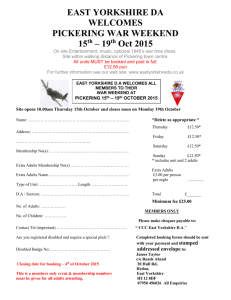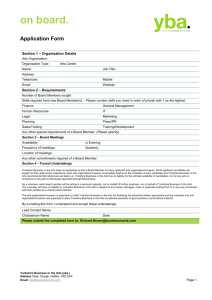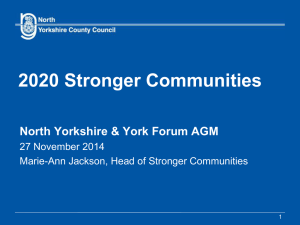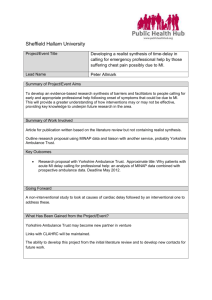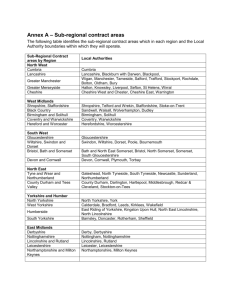Job Description - Lifeline Project
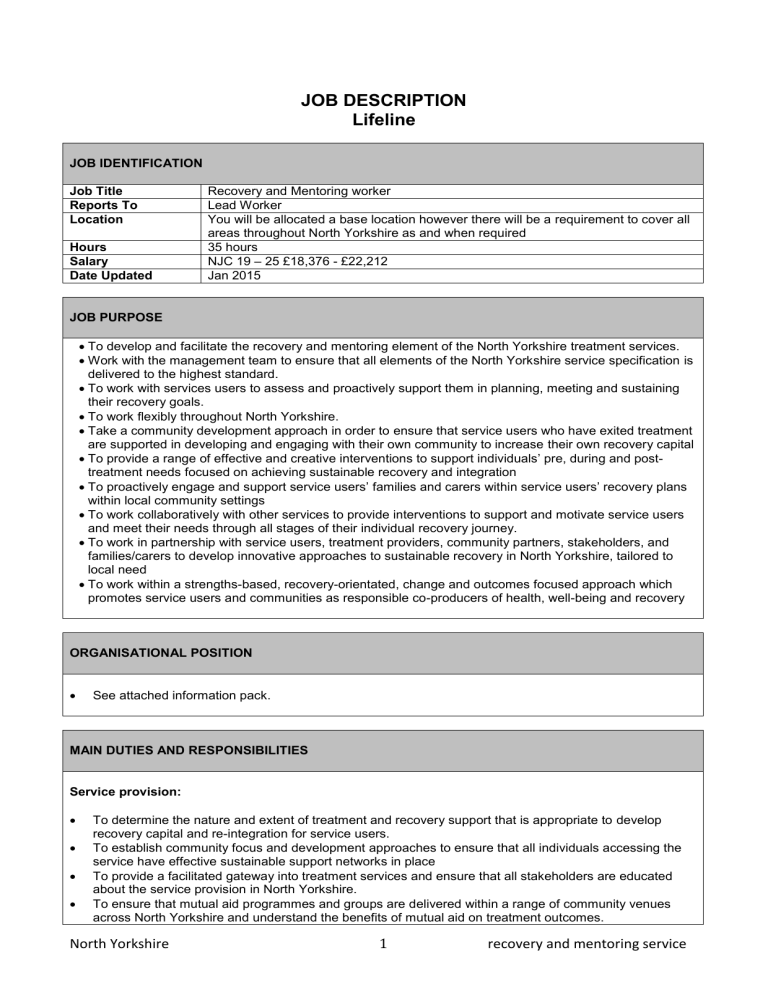
JOB DESCRIPTION
Lifeline
JOB IDENTIFICATION
Job Title
Reports To
Location
Recovery and Mentoring worker
Lead Worker
You will be allocated a base location however there will be a requirement to cover all areas throughout North Yorkshire as and when required
Hours
Salary
Date Updated
35 hours
NJC 19 – 25 £18,376 - £22,212
Jan 2015
JOB PURPOSE
To develop and facilitate the recovery and mentoring element of the North Yorkshire treatment services.
Work with the management team to ensure that all elements of the North Yorkshire service specification is delivered to the highest standard.
To work with services users to assess and proactively support them in planning, meeting and sustaining their recovery goals.
To work flexibly throughout North Yorkshire.
Take a community development approach in order to ensure that service users who have exited treatment are supported in developing and engaging with their own community to increase their own recovery capital
To provide a range of effective and creative interventions to support in dividuals’ pre, during and posttreatment needs focused on achieving sustainable recovery and integration
To proactively engage and support service users’ families and carers within service users’ recovery plans within local community settings
To work collaboratively with other services to provide interventions to support and motivate service users and meet their needs through all stages of their individual recovery journey.
To work in partnership with service users, treatment providers, community partners, stakeholders, and families/carers to develop innovative approaches to sustainable recovery in North Yorkshire, tailored to local need
To work within a strengths-based, recovery-orientated, change and outcomes focused approach which promotes service users and communities as responsible co-producers of health, well-being and recovery
ORGANISATIONAL POSITION
See attached information pack.
MAIN DUTIES AND RESPONSIBILITIES
Service provision:
To determine the nature and extent of treatment and recovery support that is appropriate to develop recovery capital and re-integration for service users.
To establish community focus and development approaches to ensure that all individuals accessing the service have effective sustainable support networks in place
To provide a facilitated gateway into treatment services and ensure that all stakeholders are educated about the service provision in North Yorkshire.
To ensure that mutual aid programmes and groups are delivered within a range of community venues across North Yorkshire and understand the benefits of mutual aid on treatment outcomes.
North Yorkshire
1 recovery and mentoring service
To provide information and advice through the Single Point of Contact to service users, parents and carers, and professionals in North Yorkshire, such as referrals to available community services, information around specific substances including all drugs and alcohol, explaining the assessment process and relapse prevention advice and support pathways.
Identify any needs for referrals for the service users to access other services relating to their ongoing health e.g. dentist, mental health, family services etc.
To educate services users about their rights and responsibilities around data protection and with whom their information is shared and how this will benefit them
To facilitate service user ’s family/carers being supported through local carer’s services
To support service users to access the full range of provision within the treatment system
To identify and support access to community resources to support recovery within the community.
To build and develop service users’ personal strengths, social networks and recovery capital (social, physical, human and cultural).
To record all documentation and case-notes to a high standard and within required time frames.
To support systems and structures that are responsive to the needs of individuals with different levels of risk, complexity, severity, and strengths.
To provide a range of flexible and effective psychosocial interventions (standard, enhanced and targeted) relevant at the change and completion stages in line with national guidance.
To ensure that service users maintain regular health checks including BBV and tuberculosis screening.
To fully inform service users about their recovery/treatment options, involve them in decisions about their treatment, obtain their informed consent for information sharing, and encourage them to take opportunities to achieve a sustained recovery.
To support ‘visible recovery’ within the service, focusing upon exit from treatment to service users, working with dedicated recovery individuals and information.
To develop innovative and engaging ways of showcasing recovery across North Yorkshire, organising local recovery events and stakeholder engagement activities and working jointly with local partners through community settings
To work collaboratively and proactively with other members of staff, volunteers and mentors to ensure that the recovery and mentoring service is delivering it’s outcomes in line with the service specification.
To effect the transition of service users into structured treatment and facilitate service user’s engagement into any and all community/recovery support upon discharge from treatment.
Performance and personal management:
To work flexibly to provide adequate cover for all aspects of the service across North Yorkshire.
To engage with, work alongside and provide support and supervision to volunteers and peer mentors as required.
To work within, and contribute positively to, an appropriate culture of established values and expectations, embracing and implementing change.
To be responsible for performance management at an individual level through: self-management; delivery of goals and tasks set; delivery of contractual requirements, targets and outcomes; and reporting progress.
To actively engage in opportunities for learning and development at an individual and team level.
To comply with operational management systems of supervision, objectives, appraisal and induction.
To work collaboratively, creatively and flexibly, to empower, challenge and change service users, peer mentors and volunteers.
To develop competencies to effectively deliver a range of psychosocial and other interventions required, undertaking training matched to the role as required.
To comply with data collection procedures and reporting to ensure effective recording of performance monitoring, outcomes, and service user information, including identifying areas of non-engagement.
To adhere to the implementation of risk management procedures (including child and adult safeguarding protocols) taking personal responsibility for keeping up to date on the requirements of these procedures.
Service development:
To take a lead in specific targeted service developments as required.
To form productive working relationships with external agencies and professionals, existing and new, to ensure that service users have access to a wide and varied range of recovery and community resources.
To provide service users with ongoing opportunities to consult on service development, working jointly to develop and deliver services, as appropriate, under the direction of management.
North Yorkshire
2 recovery and mentoring service
To contribute to the sustainability of North Yorkshire recovery and mentoring service’s growth through the delivery of best practice and quality services and achieving targets and lasting outcomes for its beneficiaries.
To ensure an appropriate level of strategic awareness at industry, local, organisational and service levels.
Specialist delivery: Your primary role
Single point of contact- be the initial contact point for all service users, professionals and partner organisations seeking information about drug and/or alcohol misuse. This would include assessing referral need, providing information to parents and making onward referrals to appropriate services for both parents/ carers and service users.
Meet and greet – targeting service users who are not engaged in treatment. Motivating those service users to engage with services. Increase engagement of naïve drug and alcohol users into structured treatment.
Single assessment and recovery planning framework.
Operate and contribute to the single assessment and recovery planning framework including any person the service user may wish to aid their recovery and engagement.
Recovery navigation. assist service users to identify the likely interventions and services to meet their needs. This will probably include attending mutual aid groups and initial appointments with service users.
Leading service developments to ensure maximum attendance for all clients into structured treatment.
Develop pathways for service u sers into a broad range of ‘wrap- around’ community/health services.
Core mentoring. To assist service users in identifying their own recovery capital and, using a strength based approach support the service users in becoming self-sufficient and maintain their long term recovery.
You have joint responsibility for the following areas:
Facilitating recovery communities . Facilitating, developing and sustaining recovery communities including abstinent based support. Developing new, self-sustaining recovery communities. Providing continuing opportunities for services users to become peer mentors and develop their own recovery capital by supporting others. This will include training, supervision and support.
Community development.
To work within an asset based community development model and mobilise community assets to support long term and sustainable recovery for service users. To actively challenge stigma via education such as community development and working with employers.
Assertive engagement Implement assertive outreach to engage individuals who are eligible for the integrated service who are not yet engaged. This will also involve the provision of assertive engagement to work with service users who have disengaged from their service.
GENERAL DUTIES
To personify a positive, collaborative and recovery-focused work ethic.
To present a professional appearance, help maintain an orderly working environment and act at all times to uphold the good reputation of Lifeline Project, Changing Lives and the North Yorkshire Service
To ensure that all visitors to the service (including service users, families/carers, professionals and the general public) are welcomed in a responsive, helpful and professional manner.
To ensure service users’ and professionals’ experience of Lifeline/ Changing Lives is positive including by taking personal responsibility for answering ringing telephones and promptly dealing with inappropriate behaviour by staff, volunteers, peer mentors or service users.
To attend meetings at appointed times, maintain professional personnel and service user records and meet deadlines.
To work flexibly across North Yorkshire, including providing duty, late working and weekend cover as required.
To proactively maintain professional knowledge and practice and attend, use and contribute to supervision and team meetings effectively.
To assess risk and safeguarding issues, undertake risk and need assessments when appropriate and report any potential risk and safeguarding issues to ensure staff, service users and children are protected.
To work within professional boundaries maintaining safety and appropriate confidentiality at all times.
To contribute to organisational initiatives as required.
To demonstrate commitment to Lifeline’s and Changing Lives statements of Mission, Vision and Values and strategy, ensuring that they inform, and are embedded within, service delivery and practice.
North Yorkshire
3 recovery and mentoring service
To read and comply with all relevant policies and procedures, at the start of your employment and again whenever they are added to or changed, as available (on L ifeline’s/ Changing Lives website)
To work flexibly to undertake such other reasonable duties and responsibilities, at any location within reasonable daily travel from your main place of work.
To carry out responsibilities with clear regard to Lifeline’s/Changing Lives Equal Opportunities,
Health and Safety, and other relevant employee focused policies and procedures.
JOB DESCRIPTION AGREEMENT
This is an outline job description and may be subject to change according to the needs of the job, in consultation with the post holder.
Job Holder’s
Signature
Post Holder’s
Signature
Date
Date
Generic personal criteria for recovery and mentoring service.
All criteria are Essential unless otherwise indicated
Experience (through paid/voluntary work or personal experience)
Experience of communicating and engaging with a broad range of people.
Experience of managing change
Experience of using a variety of methods to communicate in a range of settings.
Experience of achieving goals
Experience of building positive relationships with communities and partners
Experience of working with vulnerable people
Experience of working with external agencies in order to develop and influence change
Experience of community development and engagement
Knowledge
An indepth knowledge of the term ‘recovery’ in relation to drug and alcohol misuse and the latest
Government Drug treatment strategy (desirable)
Experience of working with people who have a drug and alcohol misuse issue and knowledge of ways for them to achieve their goals. (desirable)
A good knowledge of Mutual aid options in the community and the awareness of how to access them to achieve support.
Education and Training
NVQ level 3 in Health and Social Care, and/or equivalent professional qualification (e.g. Health Care,
Nursing, Social Work, equivalent overseas qualification). or willingness to work towards( desirable)
Skills and abilities
A commitment to learning new skills and developing knowledge base.
The ability to quickly establish rapport with people and encourage them to make changes in their life.
Ability to form therapeutic relationships with service users and carers and a keenness to make a positive contribution towards the reintegration of service users into the local community.
The ability to remain self-motivated particularly in a challenging situation.
North Yorkshire
4 recovery and mentoring service
Good skills with IT and the ability to collate information in a written format.
Commitment to working collaboratively with co-workers, colleagues in other agencies, and external services to facilitate positive recovery outcomes for service users.
Commitment to sharing knowledge, expertise and learning with colleagues (co-workers, volunteers, other professionals) in order to improve standards of practice within the service and the wider treatment environment.
Ability to deliver a flexible and adaptable approach in order to develop and deliver services that are responsive and accessible to the needs of service users and be open to change.
Commitment to continuous improvement in professional competence and skills in order to provide a high standard of recovery-focused care to service users.
Demonstrable understanding of professional boundaries with service users, carers and professionals.
The confidence to approach people in a variety of environments and talk to them about recovery.
Additional Factors
A desire to work within, and contribute to, a culture that is positive, dynamic, forward-thinking and outcomes-focused.
A non-judgmental attitude towards people affected by drug and/or alcohol use.
Full driving licence and access to own transport.
Willing to work in a flexible way including varied and unsociable hours throughout North Yorkshire
North Yorkshire
5 recovery and mentoring service
